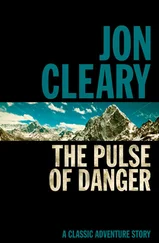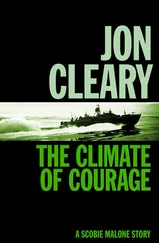They were walking on the cliff side of the railway line. The track curved round one of the many tight bends and they looked across at the tumble of rocks and earth and trees just ahead of the grunting, steaming engine. As they passed the Ranee’s private carriage, she came out on to its platform right above Farnol. He was surprised to see Baron von Albern, the German Consul-General, standing in the doorway behind her; he had not known her to be particularly friendly to the Baron. But he made no comment.
‘Are we going to be delayed long, Major?’
‘I don’t know, Your Highness. But from the look of it from here, I’ll be surprised if we get through at all.’
Other than the two private cars of the Ranee and the Nawab, all the carriages had box compartments. People were leaning out the windows, voluble and curious. Farnol, Karim and the sergeant walked on past them, careful not to miss their step on the rough permanent way and go plunging down the hillside into the trees below. Trees cloaked the steep hillside above the track and Farnol, on edge again, recognized the situation for an ideal ambush. He had instinctively chosen to walk along the outer edge of the permanent way, with the train itself as a barricade against any gunfire that might come from up there in the trees.
He stopped, said quietly, ‘Sergeant, go back and deploy your men along the other side of the train. Tell them to keep low, in against the bank. And see that no one gets out of the train.’
The sergeant looked surprised, but he was an old campaigner and he took off at once on the order, running back towards the rear of the train. Immediately above Farnol a voice said, ‘Something wrong?’
A man was hanging out the window of one of the compartments. He was hatless and his thin blond hair hung down in a fringe round his long-nosed, long-jawed face. He had the adroit eyes of the ambitious or the survivor, and Farnol wondered how acute his hearing was.
‘Nothing.’ He wanted no panic starting up amongst the passengers.
‘But I heard you tell the sergeant –’
Farnol stared up at the man. ‘You heard me tell him nothing, sir. You understand what I’m saying?’
‘Of course,’ the man said after a moment. But other heads were hanging out of windows close by and as Farnol walked on he saw the heads withdraw and he felt, if he did not hear, the murmurs inside the compartments.
The engine-driver and his fireman were standing at the front of the train with the conductor. Farnol introduced himself and the driver, a chee-chee with a plump face and a thick moustache, looking like a coal-dusted walrus, shook his head resignedly.
‘Never get past here in a month of Sundays, sir.’ The landslide was a sixty-foot-wide mound of rocks, earth and trees that covered the track and ran down to disappear into the trees below. ‘I don’t understand it, sir. There ain’t been any rain for a fortnight, that’s what usually causes the slides.’
‘Karim, go up to the top of the slide. Keep your eyes peeled.’
Karim caught the warning in Farnol’s voice, unslung his rifle and went clambering up the slope beside the landslide. Then the sergeant came back and with him was the Nawab.
‘My men are in position, sir. I tried to tell His Highness he oughta stay in the train –’ The sergeant was a 12-year man, his dislike of India and Indians of all ranks, but particularly princes, burned into his dark, wizened face.
‘If something’s going on, Clive, I think you can do with my help.’ The Nawab sounded less British, less an impostor. ‘My bodyguard is back there, six men with rifles.’
‘I’m hoping we shan’t need them.’
Then Karim came sliding down the slope. ‘Oh, I don’t like it, sahib. Some bugger has used dynamite up there –’
‘Righto,’ Farnol snapped, ‘everyone back behind the engine! Sergeant, get down and warn your men. Better get the Nawab’s men, too. Tell them to take as much cover as they can. And tell all the passengers to keep away from the windows on your side of the train.’
The sergeant went round the front of the engine and raced down the track below the trees. Farnol and the others remained on the outer edge of the track, the train crew all squatting down to make themselves smaller targets.
‘Is it an ambush?’ the Nawab said.
‘I don’t know, Bertie. It could be dacoits. I suppose Mala herself must be carrying a fortune in jewels with her. You too?’
‘One is expected to put on a show. I’m afraid I’ve brought the bally lot. The wives, y’know. They’re all looking forward to dazzling the English ladies. God knows how much the blighters would get if they did rob us. A couple of million pounds’ worth at least.’
‘I can’t understand why they haven’t already put in an appearance, or fired on us.’ Farnol looked around him, puzzled. ‘At least one shot, just to let us know they’re here.’
There was no sound but the hissing of steam from the engine’s boiler. A chill breeze blew up the narrow tree-shrouded valley below them; an eagle hung in the air like an ominous leaf; clouds seemed to form out of nothing to cover the sun and turn the green pines black. Then Farnol caught a glimpse of movement and round the next bend up ahead came a small flat-bed trolley-car, two men working the seesaw lever that propelled it and a third man sitting on the front of the trolley. The two men suddenly stopped pumping as soon as they saw the landslide and the trolley slid to a stop just short of it.
‘Stay here!’
Farnol left the Nawab and the others still sheltered beside the engine and scrambled across the slide, expecting a bullet at any moment to hit him or slap into the dirt beside him. Twice he missed his footing and he had to grab at a fallen tree as the earth slipped away beneath him; once he just managed to jump ahead as the tree he had grabbed also slid down; out of the corner of his eye he saw it plunge over the edge and a moment later heard it crash into the trees below. He had just reached the far side of the slide when there was a rumble behind him. He turned to see the rocks and earth and trees slipping away, taking a section of the track with it. The rumbling deepened, then faded; dust rose up in a brown cloud and when it cleared there was a wide gap in the ledge that carried the railway line. It was going to take a month of Sundays, as the driver had said, before any train would be running on this part of the track again.
The three men on the trolley were Post and Telegraph workers. Two of them were Indians, the two who had been doing the hard work on the lever handles, and the other was a chee-chee , one who might have passed for European but for his slightly bluish gums and the blue marks in his finger-nails. He was grey-haired and in his fifties, his gullied face a network of lines and pockmarks.
‘No, sir, we didn’t see no soldiers down the line. Nobody. We been looking for breaks in the telegraph line, I dunno nothing about the telephone wires. We found four breaks between here and Solan, sir, cut by snips. I don’t like the looks of it. These buggers here wanted to go home right away.’ He nodded to the two Indians standing in the background; then he winked at Farnol, man to man, us whites sticking together. ‘You know what they’re like soon’s they get a sniff of trouble.’
Who can blame them? thought Farnol; but he said, ‘Gibson, I want you to go back to Solan, get on the telegraph and ask the Railway Superintendent at Kalka to send up another train immediately. You can leave your two fellows here and I’ll send two soldiers with you. It’s all downhill so you should make pretty quick time.’
The sergeant brought up two soldiers, who cautiously made their way across the slide above the gap. Farnol gave them instructions; they looked at him dubiously but scrambled aboard the trolley. They took up their positions on the front of the trolley, their rifles at the ready, and Gibson got up behind them.
Читать дальше












